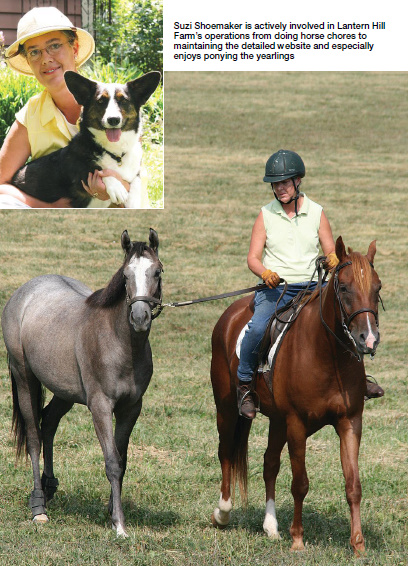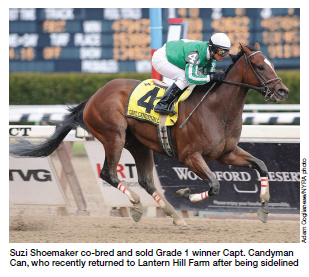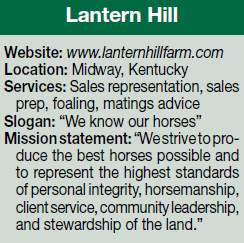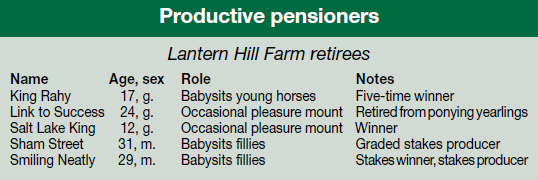|
Soul Good: Thoroughbred Times Profiles Suzi July 13, 2011 Thoroughbred Times - July 16, 2011 - Page 32
 SUZI SHOEMAKER was just launching her career when she decided to take a breather from the horse business and concentrate on restoring a recently purchased home. In the process, she did some soul searching and when the reconstruction project was completed, Shoemaker had a new outlook. SUZI SHOEMAKER was just launching her career when she decided to take a breather from the horse business and concentrate on restoring a recently purchased home. In the process, she did some soul searching and when the reconstruction project was completed, Shoemaker had a new outlook.
“I learned that I never wanted to be away from horses again,” Shoemaker said.
Since that turning point, Shoemaker has been immersed in horses as the owner and operator of Lantern Hill Farm in Midway, Kentucky. She lives on the historic property and is actively involved in daily operations, from doing horse chores to updating the farm’s comprehensive website. She especially enjoys ponying the yearlings aboard her Quarter Horse Cutter.
Shoemaker’s life always has revolved around horses. She grew up in upstate New York showing American Saddlebreds and ventured to Lexington in 1976 for that breed’s famed Junior League Horse Show.
“I did not want to leave,” she said. “I just fell in love with Lexington.”
She returned to the Empire State and completed her animal science degree from Cornell University in 1978 before packing her belongings into a pickup truck and with her horse in tow headed to Lexington. Through a connection from the horse show world, Shoemaker secured a job at a farm with American Saddlebreds and Thoroughbreds. Although originally hired to help in the office, Shoemaker soon was assigned to the barn where her salesprepping duties included riding a few Thoroughbred yearlings.
During that time, Shoemaker made a bold gamble that would shape her destiny. With a $20,000 bank loan, she purchased a mare named No Crime, in foal to Bailjumper, at the 1982 Keeneland January horses of all ages sale. Within the year, two of the mare’s offspring  became stakes horses and Shoemaker sold the mare that same year for $45,000 and her subsequent Bailjumper foal as a short yearling in January 1983 for $32,000. Recognizing the calculated risks as beginner’s luck, Shoemaker channeled the windfall into what she considered a safe investment in home restoration before returning to her passion for horses. became stakes horses and Shoemaker sold the mare that same year for $45,000 and her subsequent Bailjumper foal as a short yearling in January 1983 for $32,000. Recognizing the calculated risks as beginner’s luck, Shoemaker channeled the windfall into what she considered a safe investment in home restoration before returning to her passion for horses.
By the mid-1980s, she and her mother, Audrey Daniels, acquired more mares and began consigning under the Lantern Hill banner. In 1989, Shoemaker purchased a 75-acre farm in the Bluegrass that she later sold. In 1995, she purchased 144 acres of the former Parrishwood Farm, birthplace of Racing Hall of Fame racemare Princess Rooney, and has since expanded to 185 acres. Lantern Hill, named for a fictional lighthouse in the novel Jane of Lantern Hill, is home to more than 60 horses including recently sidelined Grade 1 winner Capt. Candyman Can, whom Shoemaker bred in a partnership with Joseph Rauch and David Zell.
Practical passion
Shoemaker credits her longevity in the often unpredictable Thoroughbred industry to a  number of factors that include her loyal client base and ability to adjust to changing markets. Instead of lamenting the reduced prices for sales horses in recent years, Shoemaker embraced the down market as an opportunity to race the horses she breeds. She has a few horses in training with Ian Wilkes and said the experience has given her a better understanding of the horses themselves and the industry in general. number of factors that include her loyal client base and ability to adjust to changing markets. Instead of lamenting the reduced prices for sales horses in recent years, Shoemaker embraced the down market as an opportunity to race the horses she breeds. She has a few horses in training with Ian Wilkes and said the experience has given her a better understanding of the horses themselves and the industry in general.
“The recession has encouraged breeders to have racetrack relationships,” she said. “It allows me to be a better breeder because I have a chance to see what the mares are actually producing.”
While she runs her operation as a business, her passion for animals does not waver, as with a filly delivered prematurely in January. Although the tiny newborn weighed just 40 pounds—about 75 pounds less than a normal foal— she was otherwise relatively healthy. Shoemaker opted for minimal veterinary care instead of euthanasia in part because the youngster traces to one of her foundation broodmares and the undersized filly has thrived.
“I have to be practical, but I have to do what is right for my soul,” she said. “If [a decision] is going to haunt me for years, I won’t do it.”
 The pint-sized preemie typifies Shoemaker’s balanced respect for all animals. She has about a half-dozen well-fed and affectionate barn cats that she relies on for rodent control. A dog merrily mingling with the barn crew was a stray Shoemaker had picked up the previous day and was in the process of finding her owner. Horses well past their prime are given new roles as pasture companions under the right circumstances. (See sidebar.) The pint-sized preemie typifies Shoemaker’s balanced respect for all animals. She has about a half-dozen well-fed and affectionate barn cats that she relies on for rodent control. A dog merrily mingling with the barn crew was a stray Shoemaker had picked up the previous day and was in the process of finding her owner. Horses well past their prime are given new roles as pasture companions under the right circumstances. (See sidebar.)
Shoemaker also did right by her soul when she placed her land into a conservation easement, which means the property cannot be developed. She went green in 2006 with the detailed process of composting the farm’s manure instead of spreading it in the fields, which can spread pathogens and seeds and can contaminate groundwater.
“No one is as amazed as I am that I can keep doing what I love, keep my bills paid, and keep raising good horses like Capt. Candyman Can and [champion] Dreaming of Anna,” she said. “What makes it so rewarding is the relationships with people who buy horses from me. Some have become lifelong friends.”
-- Liane Crossley
|